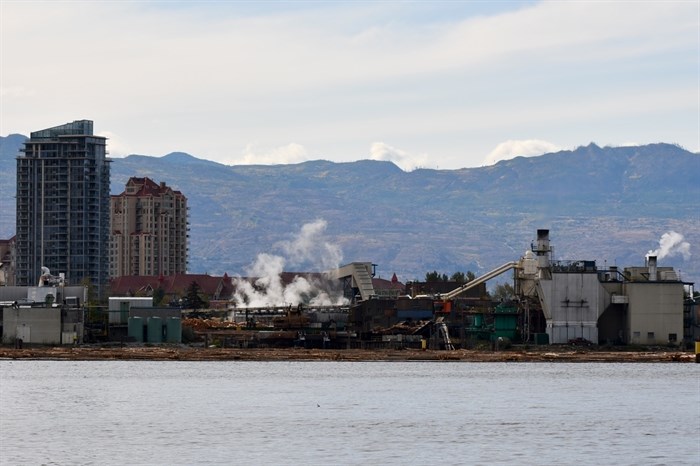
The Tolko lumber mill is one of a handful of industrial sites in Kelowna’s North End that are still zoned for heavy industrial uses.
(JOHN MCDONALD / iNFOnews.ca)
October 17, 2017 - 4:34 PM
KELOWNA - New visitors to Kelowna are often surprised to see a large-scale industrial operation — the Tolko lumber mill — sitting right beside the picturesque downtown core.
If anything shatters the image of Kelowna’s postcard waterfront, it’s the full-size log yard, drying kilns and large log booms floating just offshore, and more than a few visitors have asked, “why don’t they just get rid of it?”
Getting rid of it is complicated, first off by the hard fact the city can’t normally force a property owner to sell their land and secondly, by the fact it likes that big chunk of industrial land right where it is.
And while Kelowna might consider a change to a lighter grade of industrial zoning, planner specialist Graham March says the last thing the city would want to see in the North End is a thicket of condominium high-rises and nothing else.
“It doesn’t mean we’re not open to change,” he says. “But diversity of jobs is important and so is the diversity of the neighbourhood.”
Tolko is one of a handful of industrial sites in Kelowna’s North End that are still zoned for heavy industrial uses — think wrecking yards and bulk fuel depots — though March says with the local economy on a tear, the trend is for landowners to ask to rezone these sites for lighter industrial, commercial and residential use given their proximity to downtown.
“Some of them would be very valuable as residential land. We are seeing a lot of pressure for non-industrial use in the urban core,” March says. “We obviously do want to see more residential in the area but that’s not the only thing we want to see."
That trend is continuing along the Enterprise Way strip, once dominated by the Western Star truck manufacturing plant and the likes of Enterprise Steel, both considered heavy industry.
Western Star is long gone and Kelowna council just recently approved the rezoning of the Enterprise Steel site (from I3 heavy industrial to I2 general industrial).
All this in turn, is pushing heavy industry north to sites along Highway 97 in areas like the former Marshall Feedlot, Sexsmith Road, Kelowna International Airport and north Kelowna on the border with Lake Country.
It’s also why some in the commercial property business say Kelowna has a “critically low” industrial vacancy rate, approaching three per cent.
In its fall 2017 report, HM Commercial Group says a shortage of land in and around Kelowna has lead to the drop in inventory for the heavy industrial category.
March agrees there is a lack of “move-in ready" industrial development but says it’s not because of a shortage of land.
“There’s no shortage of land. There is a shortage of quality, fully-developed industrial buildings that are less than 10 years old,” he says.
March says there is approximately 200 hectares of industrial land made up of 127 parcels that are essentially bare land, with maybe some fencing or some small outbuildings on them.
“That’s about 40 per cent of our industrial land base of 525 hectares,” he says.
Another 100 hectares of land is not currently zoned industrial but is designated as such in Kelowna’s official community plan.
Still March says he understands the concern given the kind of resources it can take to service and develop an industrial park.
“Developing industrial land is a big undertaking. It’s hard and it’s risky,” he says.
In any case, Kelowna has seen less than half the uptake of industrial land it predicted in the 2010 official community plan.
“The first seven years have been well under projections,” March says.
Still he says it would be foolish for the city to let its industrial land base slip away because demand has been less than anticipated, mainly because it’s so hard to get it back once gone.
“You can’t sell the farm, so to speak,” he says, pointing to the cyclical nature of the market.
“We have to plan for the cycles, the changing economy, changing technology. There are a lot of innovative people out there that will come up with things I can’t even imagine yet.”
To contact a reporter for this story, email John McDonald or call 250-808-0143 or email the editor. You can also submit photos, videos or news tips to the newsroom and be entered to win a monthly prize draw.
We welcome your comments and opinions on our stories but play nice. We won't censor or delete comments unless they contain off-topic statements or links, unnecessary vulgarity, false facts, spam or obviously fake profiles. If you have any concerns about what you see in comments, email the editor in the link above.
News from © iNFOnews, 2017